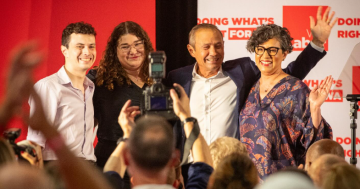
Peter Dutton wants the social media ban for under 16s in place by Christmas. Photo: Peter Dutton Facebook.
The ban on children using social media is not likely to be in force before the end of the year, but the Federal Opposition thinks it should be.
The Coalition appears to like Labor’s social media ban plans so much that it wants action on it now.
This is despite the Federal Government saying just last week the new laws wouldn’t be in force until late next year.
Opposition Leader Peter Dutton said he would like to see the news laws around banning children under 16 from using social media in place before Christmas.
There are only two sitting weeks left for parliament this year so that it would be a big ask.
Speaking to reporters in Brisbane on Tuesday (12 November), Mr Dutton said the social media ban could be implemented by Christmas if Labor acted swiftly.
“We’ve got two sitting weeks coming up and we would encourage the government to make sure that they continue the drafting process to get the bill into parliament,” he said.
While there will be exemptions for what the government is calling “low-risk platforms”, the new laws would ban children from using X-Twitter, Instagram, TikTok, Facebook, Snapchat and possibly YouTube, even if they have parental permission.
If passed, the new laws would see Australia lead the world in banning social media for children and young teenagers.
Some countries have already set in train laws to curb social media use by children, but none has tried using biometrics or government identification methods as is proposed by the Albanese government.
The planned age limit is also set higher in Australia than it is in other countries.
Announcing the plan last week, Anthony Albanese said social media was doing harm to Australia’s children, and the government was helping parents troubled by the influence it was having.
“The onus will be on social media platforms to demonstrate they are taking reasonable steps to prevent access,” the Prime Minister said.
“The onus won’t be on parents or young people. There will be no penalties for users.”
However, there will be significant penalties for social media platforms that breach the laws, with the eSafety Commissioner given powers to provide oversight and enforcement.
The laws were expected to come into force in 12 months, following a review of the yet-to-be-seen legislation – and that is still the plan as far as the government is concerned.
But the Opposition is placing pressure on the government to act sooner.
Shadow communications minister David Coleman has already extended an offer to the government to work cooperatively to get the legislation introduced and passed as soon as possible.
The Coalition is no doubt hoping that by offering bipartisan support and going one further by saying it’s ready to pass the laws now, they can gain the moral high ground.
Mr Dutton has also accused the PM of being “tricky” over an election date and said Mr Albanese should come clean about discussions with WA Premier Roger Cook about that state’s election date.
Media reports have suggested Mr Cook was looking at the possibility of shifting the WA election, which is slated for March, to make way for an early federal election.
It has led to immediate speculation the Prime Minister could be announcing a federal election as early as January. The next federal election is due in May.
But the PM denied talking with the WA Premier about election dates.
The Opposition Leader has called on the Prime Minister to “be upfront” with the Australian people about the election and any discussions he had with Mr Cook about it.
Mr Albanese hit back, saying there was no discussion about election dates and that the Opposition Leader had much more to come clean about.
“Peter Dutton needs to be upfront to the Australian people about anything at all,” the PM said when asked about it during a media conference in Tasmania.
“Anything will do. Can we have a single costed policy?”


















